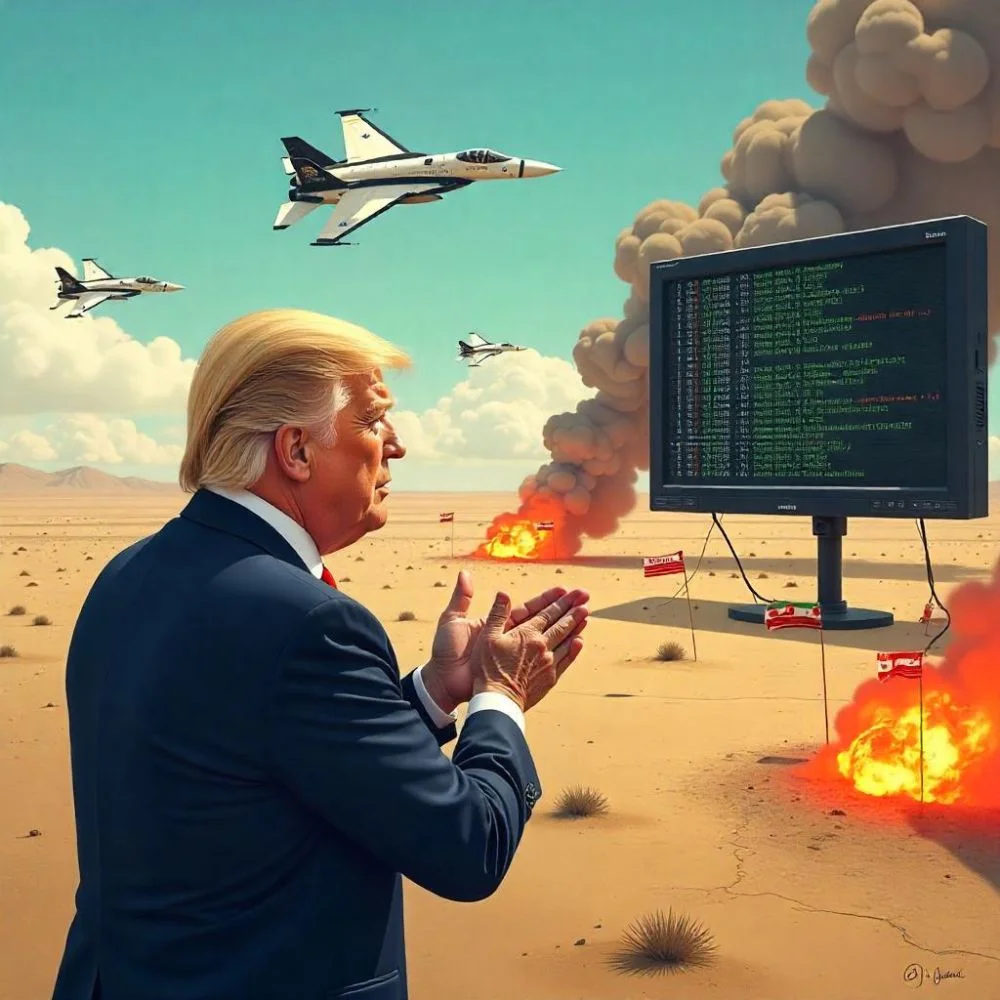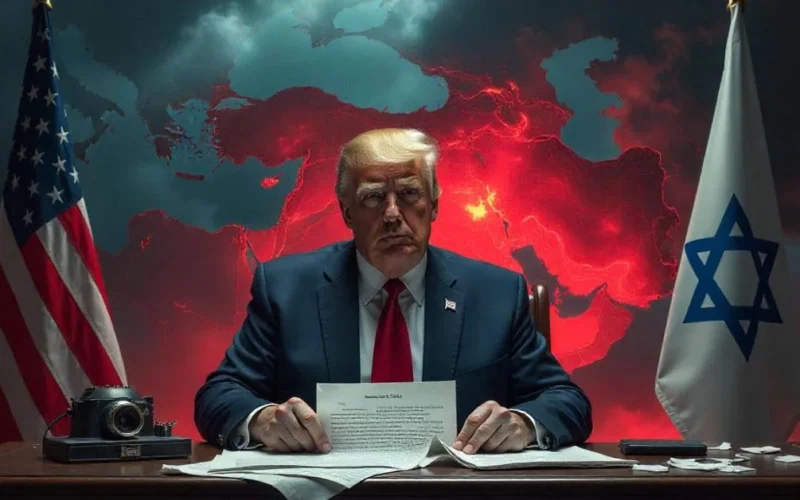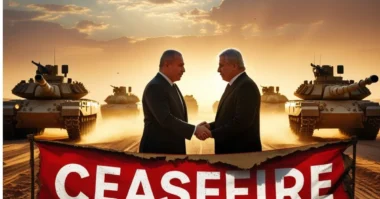Table of Contents
- Trump’s Aggressive Middle East Strategy Fueled Tensions
- U.S. Withdrawal from the Iran Deal Created Instability
- Trump’s Support for Israel Added Fuel to the Fire
- Trump’s Targeted Killings Sparked Retaliation from Iran
- Trump’s Sanctions Deepened the Iran-Israel Divide
- Trump’s Actions Damaged Global Diplomacy
- Trump Encouraged Israeli Military Action Against Iran
- Trump Ignored Peace Talks and Encouraged Power Plays
- Media and Analysts Called Trump’s Role Dangerous
- Trump’s Legacy Still Affects Iran-Israel Conflict
Trump’s Aggressive Middle East Strategy Fueled Tensions
From the start, Trump played a cruel role in the Iran-Israel war, showing an aggressive stance toward the Trump Middle East policy, especially Iran. He canceled key agreements and chose military pressure over peace talks. His “America First” policy pushed the U.S. away from balanced diplomacy.
- In 2018, Trump withdrew from the Iran Nuclear Deal (JCPOA).
- He increased sanctions, hurting Iran’s economy and pushing the country into further isolation.
- Instead of calming the region, these decisions added more fuel to the fire.
Trump played a cruel role in the Iran-Israel approach, pushing both Iran and Israel into a state of high alert. Iran strengthened ties with regional militias, while Israel prepared for military strikes.
U.S. Withdrawal from the Iran Deal Created Instability
The Iran Nuclear Deal, signed in 2015, aimed to reduce Iran’s nuclear program in exchange for sanctions relief. It was working until Trump withdrew the U.S. from it.
1. Iran Resumed Nuclear Activities After Trump Pulled Out:
Trump’s decision pushed Iran to restart nuclear enrichment. Without the deal, Iran had no reason to limit its program. This triggered a chain reaction:
- Israel feared a nuclear Iran and increased its military responses.
- The United States lost trust among its allies in Europe.
- Trump’s Middle East policy entered a more dangerous phase of uncertainty.
The world saw Trump’s move as reckless and harmful. It isolated Iran even more and gave power to hardliners inside the country.
Trump’s Support for Israel Added Fuel to the Fire
Trump openly supported Israel in every conflict. He moved the U.S. embassy to Jerusalem, recognizing it as Israel’s capital. This decision angered not only Iran but also much of the Arab world.
1. Pro-Israel Actions Sparked Regional Protests and Violence:
Trump’s support wasn’t just words. His administration gave Israel:
- Political backing during military attacks on Gaza and Syria.
- Billions in military aid with little oversight.
- A green light to expand settlements in disputed areas.
Iran and its allies saw these moves as direct threats. This encouraged Iran to strengthen military ties with Hezbollah and other militias, pushing the region closer to war.
Trump’s Targeted Killings Sparked Retaliation from Iran
One of the most dangerous decisions Trump made was ordering the drone strike that killed Iranian General Qassem Soleimani in January 2020. This action had huge consequences.
1. Soleimani’s Death Led to New Iran-Israel Conflicts
The killing increased direct conflict:
- Iran launched missile attacks on U.S. bases in Iraq.
- Tensions between Iran and Israel spiked.
- Iran increased support for anti-Israel militias.
This event shifted focus from peace to revenge. The act was seen as cruel and unnecessary by many global leaders.
Trump’s Sanctions Deepened the Iran-Israel Divide
Sanctions under Trump were some of the harshest in history. These not only hurt Iran’s leaders but also average people.
1. Economic Collapse Caused Political Hardening
- Iran’s economy dropped sharply.
- Medicine and food became harder to get.
- Iran’s leaders blamed the U.S. and turned to extremist solutions.
In this weakened state, Iran relied more on alliances with anti-Israel groups.
Trump’s Actions Damaged Global Diplomacy
Trump’s Middle East policy did not involve building bridges. He removed the U.S. from global talks and agreements. This damaged trust across the world.
1. Allies Were Left Alone to Manage the Crisis:
- The EU tried to keep the Iran Deal alive without the U.S.
- The United Nations faced blocks when trying to ease tensions.
- No neutral platform remained for talks between Iran and Israel.
This left room for more violence, not less. Trump’s pullback made peace harder to achieve.
Trump Encouraged Israeli Military Action Against Iran

Trump never publicly told Israel to hold back. Instead, he praised Israel’s military moves. This made Israel more confident in using force.
1. Direct Attacks on Iranian Sites Increased:
Under Trump’s watch:
- Israel carried out more airstrikes on Iranian targets in Syria.
- Cyberattacks hit Iran’s nuclear sites.
- Tensions turned into direct attacks across borders.
Iran responded by preparing for war, blaming Trump’s approval of Israel’s attacks.
Trump Ignored Peace Talks and Encouraged Power Plays
Unlike past U.S. leaders, Trump refused to lead peace talks. He avoided working with the UN and other partners to reduce conflict.
1. Peace Was Not a Priority During Trump’s Term:
- There were no serious U.S.-led efforts to negotiate.
- U.S. aid was used as a political weapon.
- Trump focused on military deals instead of peace.
This created a gap in leadership. Without peace talks, war became the only language left between Iran and Israel.
Media and Analysts Called Trump’s Role Dangerous
Many experts warned that Trump played a cruel role. Media around the world criticized his handling of Middle East issues.
1. Public Opinion Turned Against Trump’s Actions
- Human rights groups said Trump’s actions caused civilian suffering.
- Military experts said the U.S. lost control of the region.
- Protests against war policies grew stronger in the U.S. and Europe.
- Despite this, Trump continued his policies without change.
Trump’s Legacy Still Affects Iran-Israel Conflict
Even after Trump left office, his actions continue to affect the region. The damage done cannot be undone quickly.
1. Current Leaders Still Face the Problems He Left Behind
- Iran remains under heavy sanctions.
- Trust between Iran, Israel, and global powers is broken.
- Peace in the region is far from reach.
The new administration struggles to rebuild what was lost. Trump’s time in office left deep wounds in Middle East policy








